The Care and Feeding of World-Changers

I spent the evening at Barnes & Noble last night, and did a lot of reading in the café area. I spent most of the time reading the first part of Haruki Murakami’s new book, What I Talk About When I Talk About Running. It’s part running log, part self-help guide, and part writing memoir. I love it.
I read a few other things too – the BBC Focus on Africa magazine, a travel guide for Sri Lanka, and a quick look at a memoir of someone who spent two years at Harvard Business School.
I tend to spend a lot of time reading like that, although recently I’ve cut back. That’s not a good sign – I believe reading is one of the most important things we can do every day – so I’m working on fixing it.
The regular intake of valuable resources, especially books, is crucial to the development of any committed world-changer.
In this post I’ll share more about why reading is so important, and let you know about a few other materials I’ve been checking out recently.
First, let’s say you’ve got your two answers to the most important questions in the universe, you’re building a small army, and preparing to launch a plan of attack (or scale up your current plan). How do you keep the momentum going?
Without regular doses of the right resources, your world-changing will be limited, and that momentum will shift downwards. Since we live in an age where access to information has been democratized (at least for everyone able to read this essay), there’s no real excuse for not taking the time out to learn.
Good resources can inform, inspire, or entertain. These goals are not mutually exclusive; some resources can accomplish more than one at the same time.
Fiction
I try to read at least one work of literary fiction a month. I recently read Never Let Me Go and Baudolino, both of which I’d wholeheartedly recommend. Earlier this year I read The Rector of Justin and re-read A Wild Sheep Chase, another Murakami book. I picked up Harbor for the last trip, but it didn’t arrive on time, so I’ll have it for the next one.
For less intellectual entertainment resources, I check out the Fail Blog, GraphJam, and a few online comics.
Non-Fiction
Some of my all-time favorites are linked on my Inspiration page. In addition to those, recently I’ve discovered The Power of Full Engagement and have been slowly reading that.
Earlier this year I also read The 7 Habits for the first time ever. For some reason I missed it in its original shining hour, but reading it felt very familiar. I realized that I lot of the principles and examples in the book have been adapted (and sometimes stolen without credit) by many other writers and teachers in the personal development field.
I have to admit that I thought a bit less of the people I’ve learned from who used Stephen Covey’s stories without any attribution. Maybe I should read The 8th Habit next and see what else has been stolen.
(Note to Prospective Gurus: if you want to become a self-help teacher, by all means, use the best stuff that’s out there. But you should also create your own material, and credit what you do end up borrowing or adapting.)
Alternative Learning Styles
I’m an old-school fan of traditional books, and probably always will be. For me, there’s something about holding the paper and ink in my hands that isn’t easily replicable with other mediums. But it’s true that not everyone has the same learning style, and it’s always good to mix it up a bit. When I’m running I usually listen to a 20-minute language learning podcast before switching over to high-energy music for the rest of the run. I’m not an inherently good language learner and don’t always enjoy the process, but once I start the podcast I can usually stick with it until the end.
In addition to language learning, the iTunes directory has an increasingly large selection of free educational resources. There are also video podcasts, which don’t work well while running (I’ve tried and it isn’t pretty; trust me) but can be fun to check out on the bus or airplane.
For paid products, the Teaching Company has some fun courses which I’m sure you can learn a lot from. If I don’t sound too certain, it’s because this is definitely not my learning style. I have a hard time listening to lectures.
(One tip: these DVD and CD products are pretty expensive. You can get a better deal by shopping on eBay for used copies.)
Eliminating Distractions
While I advocate taking in many diverse sources of information, I also agree that you should eliminate as many unimportant distractions as possible. For me, the biggest distraction is internet surfing. I have an incredible ability to spend hours in front of the computer doing nothing of value. An hour will pass and I don’t even remember what web sites I’ve been reading. Yikes—that’s not good.
To end, or at least cut back on this bad habit, I’ve had to set rules for myself. The current ones are:
- Gmail three times a day (no more)
- News-reading twice a day (no more)
- Try to initiate at least one minor-to-moderate project a day (instead of continually responding to other things)
- Complete at least one task towards each major project
- Spend time writing first thing in the morning
- Never feel bad about stopping work to exercise
Speaking of the Murakami book, one passage I read last night was especially relevant.
I’m struck by how, except when you’re young, you really need to prioritize in life, figuring out in what order you should divide up your time and energy. If you don’t get that sort of system set by a certain age, you’ll lack focus and your life will be out of balance. I placed the highest priority on the sort of life that lets me focus on writing… I felt that the indispensible relationship I should build in my life was not with a specific person, but with an unspecified number of readers. As long as I got my day-to-day life set so that each work was an improvement over the last, then many of my readers would welcome whatever life I chose for myself. Shouldn’t this be my duty as a novelist, and my top priority? My opinion hasn’t changed over the years.
Except for being a novelist, that’s pretty much exactly how I feel about what I want to do. But I know I have a lot to learn, so that’s why I keep reading.
What Resources Do You Rely On?
I included some of what I’m reading these days in case you’re looking for referrals, but it’s important to read according to your own preferences.
What’s on your bookshelf – or your iPod, your Kindle, or whatever – these days?
###
Did you enjoy this article? Please pass it on to others at StumbleUpon, or share your own thoughts in the comments section.
Image by Paul Watson


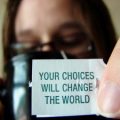
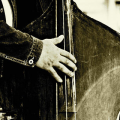
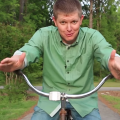
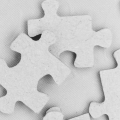
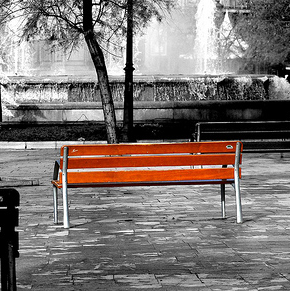
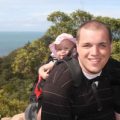
25 Comments
I don’t know why, but this post really struck a chord with me. Your blog never fails to make me question why we do the things we do and how we do them.
Lately I’ve been reading memoirs (a “past couple of years” sort of thing) and general nonfiction. I recently read Peter Godwin’s When A Crocodile Eats the Sun, and have been trying to plod through Jeffrey Sachs’ The End of Poverty for a while. I’m looking to find some good travel fiction or travel memoirs about Egypt, specifically Cairo, as I’m applying to study abroad there in the spring.
Have you read Murakami’s The Wind-Up Bird Chronicle? I found it to be faintly disturbing and majorly provocative. I will have to check out this new memoir.
Someone introduced me to http://www.goodreads.com/. I recently read “Banker to the Poor”, about microlending to end poverty.
Earl Nightingale’s “Lead the Field” is probably my most re-listened audiobook. Richard Carlson’s “Don’t Sweat the Small Stuff” is another audio book that I would recommend wholeheartedly.
Tony Buzan’s Mind Map Book is a must for most World-Changers.
“The One Minute Manager” by Kenneth H. Blanchard and Spencer Johnson is so small and so very packed with wisdom that it is one of the first book I would recommend.
Basic Socionics knowledge is also important, especially for people organizing people.
From the fiction (I think it is fiction) part I would recommend *ANYTHING* by Anthony de Mello. His books are practically books of stories for small and big people alike.
This theme of “world changers” fits well with the book I’m currently reading, Edward Abbey’s “The Monkey Wrench Gang.” It seems that the Earth First! Movement probably has a genesis in the pages of this novel about a small band of social misfits who decide to take action against the mindless destruction of their landscape. Today, we would call them “terrorists” but Abbey paints a more nuanced, and thoughtful portrait.
Also, all work by Wendell Berry is a must read for anyone who is serious about world changing.
Chris,
Every time I read your blog, I get a totally different view of the same things that I have seen before. I am lucky that I have started quite young (just 24) to think about these things. Generally I have observed that many people will live a life of mediocrity.
Honestly, Some books are really very hard to read. Especially which is far from my level of thinking. The books you suggest sometimes is like that. I prefer the fiction ones though. But by the time it reaches India, it will be like an year or so after it is released in US.
Chris – Your post today could have been written by me! I have been in the self-help industry my entire life. I relate to how you feel a little less of people when you discover that they are using other peoples material. The key is to always quote people when you can. It makes you look better and people will eventually find out anyway. And as my Dad says (Zig Ziglar), if you quote somebody who ends up being wrong, its not your fault!
I have always been an avid reader, but as a homeschooling mom with two older boys and an active (and I mean ACTIVE) toddler there seems to be less and less time to enjoy a good book.
On my shelf I have “Success Through a Positive Mental Attitude,” “Tough Times Never Last but Tough People Do,” and “The Hiding Place.” All of which are oldies but definitely worth checking out!
If you’re looking for a work of literary fiction, check out Trevanian’s The Main. It’s a character study, posing as a crime novel, set in Montreal in the late 70s. I read it on a recent plane flight and finished almost all of it in one or two sittings.
My reading list has been problem-specific lately. I plan to start a small freelance business without starving, so I re-read Peter Bowerman’s _The Well-Fed Writer_. I’ve read parts of three books to help make my transistion out of my current job go more smoothly. They’ve been useful, but I need to get back to books that don’t have an immediate, practical application. Thanks for the reminder, Chris.
-Linnea
As a freelance web designer I listen to web design podcasts @ http://www.boagworld.com, I also am more of a visual learner, so with what I want to learn in regard to web design, I usually check out http://www.lynda.com, there are some great video tutorials here, it does cost $25 a month, but you can cancel at anytime without any fees!, I usually sign up for a month, watch the tutorial I needed, then once im done I cancel until some other tutorial comes out that interests me,
On the reading side ive just start David Allen’s “Getting Things Done”, so hopefully that will help me along on my freelance journey?.
The only blog I really read on a daily basis is this one, I love the way Chris writes it, plus it covers most of the subjects that interest me the most too.
I’m a Good Reads addict as well (and I just checked it to see what I read most recently!)
For non-fiction and educational purposes I’ve been reading the Seth Godin books and the most life-changing book of my last year was Animal, Vegetable, Miracle about eating locally.
The best fiction I’ve read in years was Neil Gaimon’s American Gods and now I’m starting on the rest of his canon!
I’ll have to check out good reads. I go through phases where, for months at a time, I’m really into chewing on some great books. Then I tend to need a break.
Recently I finished “The Book Thief” which just about broke my heart enough for the entire year.
I have to be careful with non-fiction. It used to overly sway me, so now I try to vet what I pick up more carefully, and take things a bit more with a grain of salt. I love clever economist commentaries, though, such as my current read, The Undercover Economist though it’s not as titillating as Freakonomics or some of Malcolm Gladwell’s stuff. 🙂
It would be great if that radio lingua network had Malay… 😉
Awesome.
I have to explain; I’ve home schooled myself (equivalent to non-schooling, really) all through high shcool, spending at least a year day-dreaming, riding horses, and wishing I was an “adult” so I could really be myself. Then I woke up, and the wasted time hit me like a sucker punch, or a knife in my back. All the things I could’ve done! All the things I could’ve learned! All the people I could’ve met!
Etc.
So NOW, I’ve been on this super-charged quest for knowledge of EVERYTHING and can’t get enough daily experiences with people, ideas, politics, and historic facts. I’m amazed and awed and overwhelmed by all the things I desperately want to know. I read like a maniac.
Thanks for articulating what I’ve felt for so long about reading being a HUGE priority. I’m new to your blog and it is, in the language of my age group, freakin’ awesome dude.
(P.S. to Reese, Freakonomics is one of the greatest, strangest, in-your-face weird books of all time. I re-read it all the time when I feel like making my head spin.)
The Alchemist by Paulo Coelho.
Also, I recently wrote an essay on why I don’t read or watch the news… at all: http://growprosperthrive.blogspot.com/2008/08/why-i-dont-watch-news.html
Love your blog!
Like many of those who left comments, the article really smacked me squarely between the eyes as well (Chris, maybe the corollary to your ass-kicking article is a “punch in the face” article 🙂 ). I have been experiencing this exact situation with my own goals…I’ve embarked, but now the work of shoveling the coal into the engine has begun, and I’ve been losing momentum, feeling as though I’m slogging through and getting slower. This was just the kind of reminder that I needed.
I have lately been too focused on books related to one of my sites (health and fitness, primarily). I say “too focused” because I feel like my writing suffers when I’m not reading a diverse set of work. When you are consumed with a book like A Consumer’s Dictionary of Food Additives, your brain gets a little wigged out, and the inspiration seems to stop gurgling. I need to read a little fiction. One book a month seems like a good target.
Thanks for shaking the cage a bit for me – I like the guidelines you’ve described here, and am going to craft a similar set. I have let most of my writing habits slip in the last few weeks, and that has got to change. Time to get the rock rolling again.
I’m a voracious reader and thought of a couple of additions you–and your readers–might like. An overlooked, but terrific, book is Bruce Grierson’s U-TURN: What If You Woke Up One Morning and Realized You Were Living the Wrong Life?
Another recent favorite of mine is MAKE THE IMPOSSIBLE POSSIBLE by Bill Strickland, along with A WHOLE NEW MIND by Daniel Pink.
I really believe that if we want to live an inspired life, we need to nurture inspiration every single day–not just when we’re in a slump. Reading carefully chosen books is a wonderfully accessible way to do just that.
As far as GMail goes. I’d love to limit it, but it wont let me shut of the automatic reload so emails keep coming as i answer old ones. any tips?
Definitely anything by Seth Godin!
Personally, I’ve been greatly inspired by Eben Pagan and his Get Altitude program and I really think that I’ve caught the entrepreneurial bug and I’ve been reading a lot of business books lately.
“Made to stick” is a must-read for anybody as well as “Freakanomics”.
I love the short version of the Starbucks story so I’m heading to get the book.
And the book that will probably greatly influence me will be the Lance Armstrong’s biography.
Weird tho, nobody has mentioned Remarque and his “All quiet on the Western Front”
And Mark Twain!
Hi Chris,
First off I’d like to thank you for pushing my wife over the edge. She has been haunted by your manifesto and is now opening her second boutique.
As for inspiration, these authors and thinkers always push me: Fulghum, Merton, Ravi Zacharias, Godin, Lincoln, Hemingway, Maugham, Salinger and Steinbeck. I’ve always had a hard time with modern fiction, but your not the first person I’ve heard cite Murakami, so it appears it may be time to pick him up.
Thanks for the “eliminating distractions” guidlines/rules. I’m a procrastinator of the worst kind – it can become paralyzing – and it is rules like these that move me forward through my days.
Thanks again and keep it up.
Cheers,
Dirt
Biographies – the things you learn and the inspiration from biographies, for me anyway, is endless. That said, most of my reading lately has been very light. Even the non-fiction (Made in America by Bill Bryson) is light – although it has actually given me a dozen or so ideas for stories. I’m in the process of “switching gears” – changing my focus away from webpages so much to writing and “real” art (not clip art or coloring pages). I’ve just ordered some books on the Law of Attraction & Money hoping for some good inspiration and ideas. My next book binge will likely be some art instruction books.
Great post- I’ve definitely noticed that times in my life when I have a habit of reading every day, I am more growth-oriented and the ideas I learn really expand my thinking. Reading Learned Optimism by Martin Seligman right now. Highly recommended!
Good rules for eliminating distractions, especially “Never feel bad about stopping work to exercise”… I usually come back more energized and full of ideas after working out. So it’s actually a more productive use of time than working for long hours without a break.
Murukami is awesome, and I really enjoyed “What I talk about when…”
Thanks for the post.
سازه فولادی نوعی سازه است که مصالح اصلی آن که برای تحمل نیروها و انتقال آنها به کار میرود از فولاد است. اتصالات به کار رفته در این نوع سازهها از نوع جوشی، پرچی و یا پیچ میباشد و بسته به نوع اتصالات قطعات طرح شده و کنترلهای مربوطه بر
روی آنها انجام میشود.
Your comments are welcome! Please be nice and use your real name.
If you have a website, include it in the website field (not in the text of the comment).
Want to see your photo in the comments? Visit Gravatar.com to get one.